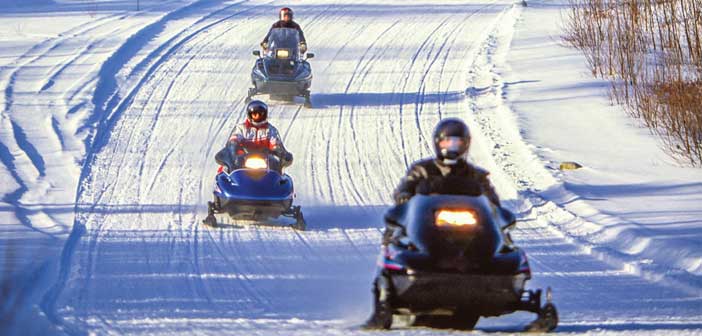Snowmobile trail permits on sale now
MANITOULIN—Ontario Federation of Snowmobile Clubs (OFSC) trail permits are on sale now for the 2016-2017 snowmobile season, and the Manitoulin Snowdusters Snowmobile Club is urging snowmobilers to take full advantage of the great early bird sales that are now only available online.
By buying your trail permit in the month of October, sledders will only pay $180—a savings of 50 percent—until November 1. For those with a ‘classic permit’ (having a snowmobile from 2001 or older), permits are just $140 until December 2, when they jump to $170.
The Snowdusters remind Manitoulin Islanders that despite the worries that some landowners had over Bill 100, Supporting Ontario Trails Act, most fears have been abated.
“As a result of the successful meeting held at Mindemoya on June 16, and as a result of the Ontario government clarifying the misunderstanding of easements over landowners’ property in the final version of the legislation (now in force) known as Supporting Ontario’s Trails Act, most of the landowners have come back on board with us,” explained Snowdusters spokesperson Brad Middleton. “As for the ones who have not, we have been largely successful in finding alternate routes around the problem areas. Some kinks remain to be worked out, but the Snowdusters want to emphasize that we will still be operating an inter-linked Island-wide system this coming snowmobiling season.”
Mr. Middleton reminded snowmobilers that when purchasing their permits online, they can choose where they want their funds to flow. “Make sure you click on the box for ‘Manitoulin Snow Dusters.’ We need your money to keep a good trail system in place.”
“Purchase of a trail permit not only allows the buyer to access trails at their local club level, but also allows the buyer to go anywhere in Ontario on the OFSC trails,” Mr. Middleton continued. “For instance, somebody from the Island can go to Espanola, Spanish, Killarney, Sudbury, French River, etc.”
Mr. Middleton noted that out of the total trail permit money, about half the money stays locally and the other half goes to OFSC head office in Barrie with the majority of the funds used to pay for the landowners’ insurance policy, “which makes the whole system possible.”
Mr. Middleton recently attended the OFSC AGM in Barrie where delegates voted on the implementation of the More on the Snow (MOTS) five-year plan.
“The MOTS strategic plan was believed to be necessary for two key reasons,” Mr. Middleton explained. “First, it was critical to the sustainability of snowmobiling as a recreational activity, in order for the sport to have any real future here in Ontario. Secondly, because money is scarce–there is a limit to what the public will pay for a trail permit. MOTS was deemed essential at both the local level, and at the provincial level. Everyone has to achieve greater efficiencies with the funds and the resources that we have to work with.”
A key element in the implementation of MOTS will be a greater level of resource sharing–especially the groomer fleet–among member clubs and districts, he added.
“The Manitoulin Snowdusters club has two large groomers due to the high number of kilometres of trail we have here on the Island,” Mr. Middleton said. “The machines aren’t getting any younger. That would mean we would need $600,000 to replace our machines, if both were done simultaneously. That kind of money is just not out there locally.”
MOTS will address the problem of the aging groomer fleet across the province in two ways, Mr. Middleton explained. First, groomer purchases will now be handled by the OFSC at the provincial level, rather than at the local club level. A certain number of groomers will be purchased each year and distributed around the province where replacement is most needed. These purchases will be made by the OFSC “in bulk” so the governing body can use economies of scale, he added. It is believed that if large purchases are put up for tender, there could be a substantial savings on the cost of each unit.
Allocation of existing groomers will now take place at the District level. Manitoulin, along with Sudbury and surrounding environs, is in District 12. The District government will now decide where and how the groomers will operate. It is not known yet how this will affect Manitoulin.
As a result of MOTS, organized snowmobiling in Ontario will now be structured differently. There will only be two real levels of authority and accountability. At the first level there will be the OFSC governing body in Barrie, which is responsible only to the government of Ontario, by way of the MTO. At the second level, there will be the District organization—in Manitoulin’s case District 12 (and run out of Sudbury) that answers to the OFSC in Barrie.
“Some complained at the AGM convention this year that with the coming of MOTS, local clubs will be reduced to nothing more than social clubs, ‘good for nothing except holding wiener roasts,’ as one delegate put it,” Mr. Middleton said. “The fear was that local clubs would lose any real say in how the process works. That is not so.”
“Local clubs will still have a voice at the AGM each year, with each getting to send two voting delegates,” he continued. “More important, the local clubs are still responsible for establishing a volunteer base in their community, maintaining good relationships with landowners and, most important, maintaining the trail infrastructure in their area, which is what snowmobiling is ultimately all about.”
Another change from the AGM is that the number of Districts in the OFSC system will be reduced from 16 down to 12. District 12, of which Manitoulin is now a part, will be increased in size by expanding northward, up past Shining Tree and Elk Lake, to “the watershed.” Attempts to take in Spanish and the French River were turned down.
To buy your permit now and take part in the early bird savings, visit www.ofsc.on.ca/experience/get-started/permits.




